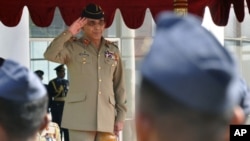A report in Thursday's edition of The New York Times says that the head of Pakistan's military, General Ashfaq Parvez Kayani, is fighting to save his position as his officer corps reacts with fury to last month's U.S. commando raid that killed Osama bin Laden in the Pakistan's garrison city of Abbottabad.
Citing unnamed sources and former Pakistani army officers, the newpaper story reports the support within the military for General Kayani’s leadership is eroding and that the man who has led Pakistan's armed forces for the last three-and-a-half years could take the fall in the aftermath of the Abbottabad raid, which has plunged the country into a downward spiral.
The article says the officer corps, which feels humiliated by the May 2 raid conducted by U.S. Special Forces, are pressing Kayani to take a stronger stand against America - to the point of severing the U.S.-Pakistani military alliance.
When asked about reports in the Western media claiming Kayani was about to be replaced, government spokesperson Tehmina Janjua was brief and to the point.
"I would not like to make any comment on speculative reports that are completely baseless," she said.
Traditionally, the military has been beyond criticism in Pakistan. It is often seen as the last line of defense against threats, both foreign and domestic, and thus has been significantly funded and held in high regard.
But in the fallout from the U.S. raid into sovereign Pakistani territory, which the Pakistani military apparently neither tried to stop nor even monitored, that reputation has been called into question.
Pakistani politician and journalist Ayaz Amir says the now-constant attacks in both the Pakistani and foreign media are taking their toll on the armed forces.
"There is almost a sense of outrage as far as public opinion is concerned, and there are every day in the media there are things about, there are questions about your competence, about whether or not you knew anything," Amir says. "So it’s bound to have an effect on the morale of the army. And this kind of back-to-the-wall feeling, a feeling of being very hurt. It has really created an atmosphere of paranoia. It’s not a very good time for the army," he says.
The military has also long had a difficult relationship with the civilian authorities in Pakistan, which has experienced four periods of military dictatorship.
Political analyst Hassan Askari says there are parties that sense the military’s weakness and are capitalizing on it.
"There are political forces that want to make their own gains, therefore their theory is to make sure that when the military is down and is in difficulties it is the time to really press the military hard and to have their own agendas to be served," says Askari.
With attacks from various quarters continuing, there is concern the military may begin a push back. But after four failed attempts at running the country, some in Pakistan insist there will not be another military takeover - even if there is the possibility, as The New York Times article suggests, of a revolt within the army.




